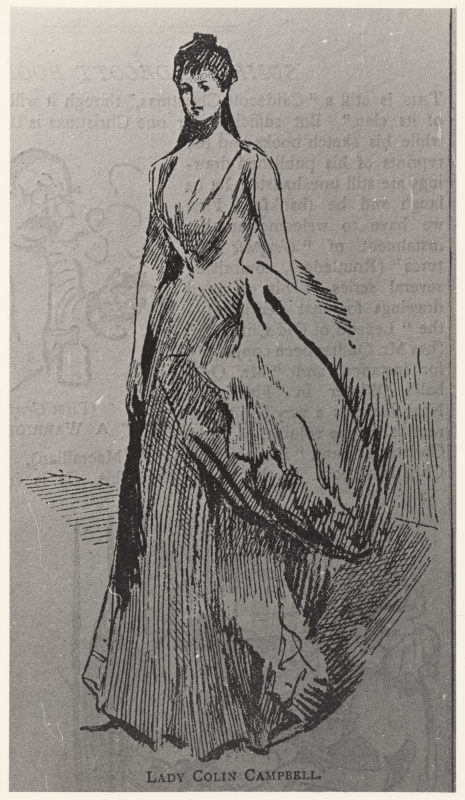Titles
Only one main title has been suggested:
- 'the white picture' (1886, Whistler). 1
- 'Harmony in White and Ivory: Portrait of Lady Colin Campbell' (1886, Society of British Artists). 2
- 'Harmony in White and Ivory: Portrait of Lady Colin Campbell' (1980, YMSM). 3
Description
A full length portrait of a woman in white evening dress, turned slightly to left. It was a portrait in vertical format.
The wood engraving of Harmony in White and Ivory: Portrait of Lady Colin Campbell [YMSM 354] suggests its proportions, and since it was a life-size full-length portrait, these proportions would correspond to a canvas of approximately 191 x 84 cm (75 x 33").
There are no photographs of the portrait extant but the woodcut published in the Pall Mall Gazette, 30 November 1886, appeared with Whistler's approval, and the original drawing may have been made by Walter Richard Sickert (1860-1942) or Théodore Roussel (1847-1926). 4 Both of them had made drawings of paintings exhibited by Whistler at the Society of British Artists, for publication (Nocturne in Blue and Gold: Valparaiso Bay [YMSM 076], Cremorne, No. 1 [YMSM 163], and Arrangement in Black, No. 8: Portrait of Mrs Cassatt [YMSM 250]).
An engraving suggests slightly different proportions, and is rather narrower in relation to the height. It also shows more details of the costume. Albert Ludovici, Jr (1852-1932) described the portrait as 'a full-length portrait of Lady Colin Campbell in a white satin dress ... The frock was one of Worth's creations, made on purpose for the portrait.' 5 One journalist mentioned that the background was grey, another, that it was 'cloudy white' and showed a 'slight figure draped in white muslin and lace'. 6 One art critic, possibly Malcolm Charles Salaman (1855-1940), described it more fully:
'The tall finely proportioned figure, in a white evening dress of the present fashion, displaying the arms and throat, stands against a delicate grey wall and a floor of a slightly deeper tone, the left arm catching up the train of the dress, in graceful curves, while the right hangs by the side holding a black shawl, the whole composition being one of singular elegance. The handsome head, with its dark hair, is set upon the ivory-toned shoulders with dignity; and it is modelled with that unerring sense of beauty without which truth is valueless in art.' 7
Sitter
Gertrude Elizabeth Campbell (Lady Colin Campbell) (1857-1911) . Whistler's affectionate letters address her as 'the lovely leopard' and 'O beautiful Leopard!' 8
Gertrude Elizabeth Blood, younger daughter of Edmond Maghlin Blood of Brickhill, Co. Clare, Ireland, married Colin Campbell (1853-1895), fifth son of the eighth Duke of Argyll, in 1881. Lady Colin's sister-in-law, Janey Sevilla Campbell (Lady Archibald Campbell) (ca 1846-d.1923), had already been painted by Whistler (see Portrait of Lady Archibald Campbell in Court Dress [YMSM 240]).
Whistler met Lady Colin Campbell in 1881, shortly after she had been painted by Frank Duveneck (1848-1919) in Venice. Whistler wrote to another friend of Venice days, one of the Duveneck 'Boys', Otto Henry Bacher (1856-1909): 'it was in the box of her future brother in law, Lord Archie, that I met the very handsome and exceedingly amiable lady – She spoke of "the Boys" and described to me her portrait with great admiration.' 9
The marriage did not last long. Lady Colin obtained a judicial separation in 1884 on grounds of cruelty. In I886 she petitioned for divorce, citing the housemaid, and her husband counter-petitioned naming three co-respondents. At the time of the exhibition, in December 1886, the lawyer George Henry Lewis (1833-1911) was cross-examining the Duke of Marlborough. Both petitions were dismissed. 10 After the case Lord Colin went to Bombay where he died in 1895.
Lady Colin was for a time art critic of The World and editor of the Ladies Field, and wrote several books including Darell Blake, A Book of the Running Brook and A Miracle in Rabbits. She was deeply interested in art, literature, fashion and sport. She died on 1 November 1911.
Notes:
1: [28 August 1886], GUW #03331.
2: Winter Exhibition, Society of British Artists, London, 1886 (cat. no. 259).
3: YMSM 1980 [more] (cat. no. 354).
4: Also published in 'Under Mr. Whistler's Regime', Pall Mall Budget, London, 2 December 1886.
5: Ludovici 1926 [more] , p. 88.
6: 'Current Art', Magazine of Art, vol. 10, 1887, pp. 109-113, at p. 111. 'The Ladies Column', Illustrated London News, 4 December 1886, p. 7.
7: Anon., 'The Society of British Artists', Sunday Times, London, 12 December 1886. Quoted in Robins 2007 [more] , p. 74.
8: [8 September 1886], GUW #03326; [19 October 1886], GUW #03332.
Last updated: 23rd May 2021 by Margaret








